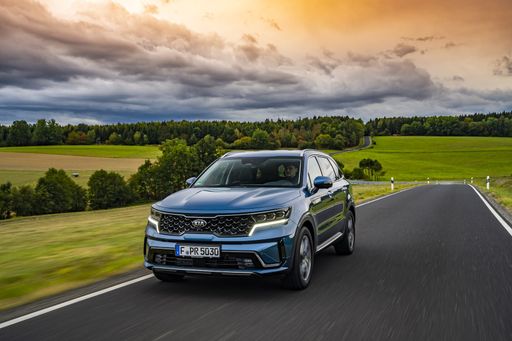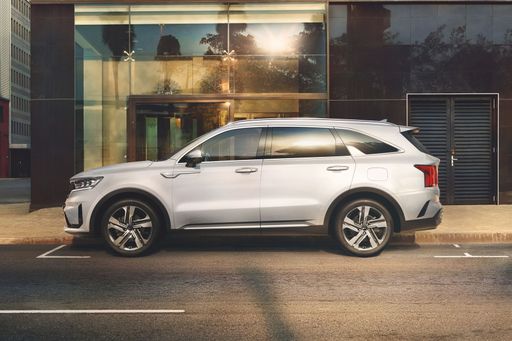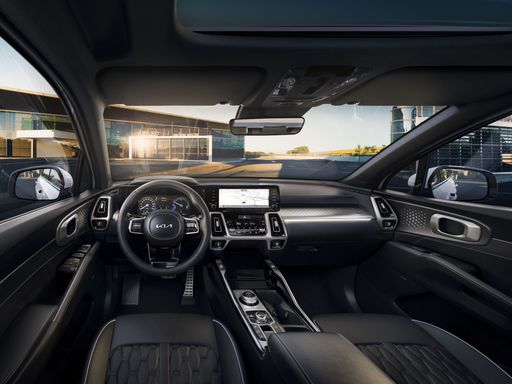Kia Sorento vs VW Tiguan – Differences & prices compared
Everyday use, family trips or long-distance drives – here’s where the differences show.
Discover whether Kia Sorento or VW Tiguan fits your lifestyle better.
The Battle of SUVs: Kia Sorento vs VW Tiguan
In the competitive world of Sport Utility Vehicles (SUVs), the Kia Sorento and the Volkswagen Tiguan stand out as formidable contenders. With 2024 models bringing fresh design elements and technological advancements, both these SUVs promise a remarkable driving experience. But when compared head to head, which one comes out on top? Let's explore the technical aspects and innovations of these two vehicles.
Engine Performance and Variants
The Kia Sorento offers a variety of engine options, including Plugin Hybrid, Full Hybrid, and Diesel. Depending on the engine type, the Sorento generates power ranging from 194 HP to 252 HP, with the plugin hybrid boasting an electric range of 55 km. This range is commendable for those looking to maximize fuel efficiency.
On the other hand, the VW Tiguan provides a wide gamut of engines including Petrol MHEV, Plugin Hybrid, Diesel, and Petrol configurations. The power ranges here from a modest 130 HP to a robust 272 HP, and the plugin hybrid can achieve up to 113 km on electric power alone, making it a top choice for city driving enthusiasts.
Transmission and Drivability
Both vehicles come equipped with automatic transmissions, with the Sorento offering options between an Automatic Gearbox and a Dual-Clutch Automatic. This setup facilitates a smooth driving experience with all-wheel and front-wheel drive types available to suit different driving needs.
The Tiguan also embraces the automatic Dual-Clutch Automatic transmission technology, providing responsive gear changes. Buyers can choose between front-wheel and all-wheel-drive options to enjoy varied terrains with confidence.
Dimensions and Design
The Kia Sorento demonstrates a commanding presence with its length of 4815 mm and a width of 1900 mm, slightly towering over its rival. It accommodates up to seven seats, making it ideal for larger families, while the trunk capacity extends up to 705 L, catering to those heavy luggage days.
Meanwhile, the Tiguan is slightly more compact at 4539 mm in length and a width of up to 1859 mm. This five-seater SUV is more suited for smaller families or individuals needing ample space without the need for extensive passenger seating. The Tiguan's trunk offers a capacity of up to 652 L.
Fuel Efficiency and Consumption
Efficiency is at the heart of both vehicles. The Sorento presents various consumption rate options from as low as 1.6 L/100 km for hybrid models to 7.2 L/100 km for diesel. This flexibility appeals to a range of eco-conscious to power-hungry drivers.
The Tiguan intrigues with its equally diverse consumption rates, ranging from an impressively economical 0.4 L/100 km for hybrids to 7.7 L/100 km for petrol models. This range demonstrates VW’s commitment to efficient fuel usage without compromising performance.
Conclusion: Which SUV Reigns Supreme?
Both the Kia Sorento and the VW Tiguan offer distinctive advantages, tailored to meet different preferences. The Sorento emerges as the leader in space and diversity of seating options, making it optimal for families and long journeys. Its hybrid options also cater to sustainability-focused drivers.
Conversely, the Tiguan excels in performance with a broader engine variety and superior electric range for its plugin hybrid. It suits those who prioritize urban mobility and efficiency intermixed with occasional escapades.
Ultimately, the decision lies in the driver's lifestyle and preferences. Whether it's the comprehensive package of the Kia Sorento or the dynamic choices of the VW Tiguan, both these SUVs deliver excellence on the road.
Here’s where it gets real: The technical differences in detail
Costs and Efficiency: Price and efficiency are often the first things buyers look at. Here it becomes clear which model has the long-term edge – whether at the pump, the plug, or in purchase price.
VW Tiguan has a clearly advantage in terms of price – it starts at 32800 £, while the Kia Sorento costs 46000 £. That’s a price difference of around 13235 £.
Fuel consumption also shows a difference: the VW Tiguan manages with 0.40 L and is therefore convincingly more efficient than the Kia Sorento with 1.60 L. The difference is about 1.20 L per 100 km.
As for range, the VW Tiguan performs convincingly better – achieving up to 129 km, about 74 km more than the Kia Sorento.
Engine and Performance: Under the bonnet, it becomes clear which model is tuned for sportiness and which one takes the lead when you hit the accelerator.
When it comes to engine power, the VW Tiguan has a slight edge – offering 272 HP compared to 252 HP. That’s roughly 20 HP more horsepower.
In acceleration from 0 to 100 km/h, the VW Tiguan is significantly quicker – completing the sprint in 5.90 s, while the Kia Sorento takes 8.80 s. That’s about 2.90 s faster.
In terms of top speed, the VW Tiguan performs a bit better – reaching 242 km/h, while the Kia Sorento tops out at 201 km/h. The difference is around 41 km/h.
There’s also a difference in torque: the Kia Sorento pulls hardly perceptible stronger with 440 Nm compared to 400 Nm. That’s about 40 Nm difference.
Space and Everyday Use: Cabin size, boot volume and payload all play a role in everyday practicality. Here, comfort and flexibility make the difference.
Seats: Kia Sorento offers evident more seating capacity – 7 vs 5.
In curb weight, the VW Tiguan is slightly lighter – 1599 kg compared to 1854 kg. The difference is around 255 kg.
In terms of boot space, the Kia Sorento offers slight more room – 705 L compared to 652 L. That’s a difference of about 53 L.
In maximum load capacity, the Kia Sorento performs distinct better – up to 2100 L, which is about 450 L more than the VW Tiguan.
When it comes to payload, Kia Sorento noticeable takes the win – 684 kg compared to 533 kg. That’s a difference of about 151 kg.
Our conclusion: The VW Tiguan proves to be outperforms in nearly all aspects and thus becomes our DriveDuel Champion!
Overall, VW Tiguan is the better all-rounder in this comparison.
Kia Sorento
The Kia Sorento is a versatile SUV that seamlessly blends style and practicality, making it an appealing choice for families and adventurers alike. With its spacious interior and thoughtful design features, it ensures a comfortable driving experience on both urban roads and country excursions. Additionally, the Sorento offers a suite of advanced safety technologies, enhancing peace of mind for its passengers.
details @ press.kia.com
@ press.kia.com
 @ press.kia.com
@ press.kia.com
 @ press.kia.com
@ press.kia.com
VW Tiguan
The VW Tiguan presents itself as a versatile and practical option in the SUV market, combining a stylish design with a spacious and comfortable interior. It offers a smooth driving experience, making it well-suited for both urban environments and longer journeys. With its focus on safety and innovative technology features, the Tiguan remains a compelling choice for families and adventurers alike.
details @ Volkswagen
@ Volkswagen
 @ Volkswagen
@ Volkswagen
 @ Volkswagen
@ Volkswagen
 @ Volkswagen
@ Volkswagen
 @ Volkswagen
@ Volkswagen
 @ Volkswagen
@ Volkswagen

|

|
|
|
|
Costs and Consumption |
|
|---|---|
|
Price
46000 - 59300 £
|
Price
32800 - 51900 £
|
|
Consumption L/100km
1.6 - 7.2 L
|
Consumption L/100km
0.4 - 8.4 L
|
|
Consumption kWh/100km
-
|
Consumption kWh/100km
-
|
|
Electric Range
55 km
|
Electric Range
119 - 129 km
|
|
Battery Capacity
-
|
Battery Capacity
19.70 kWh
|
|
co2
37 - 174 g/km
|
co2
8 - 190 g/km
|
|
Fuel tank capacity
47 - 67 L
|
Fuel tank capacity
45 - 58 L
|
Dimensions and Body |
|
|---|---|
|
Body Type
SUV
|
Body Type
SUV
|
|
Seats
5 - 7
|
Seats
5
|
|
Doors
5
|
Doors
5
|
|
Curb weight
1854 - 2105 kg
|
Curb weight
1599 - 1890 kg
|
|
Trunk capacity
175 - 705 L
|
Trunk capacity
490 - 652 L
|
|
Length
4810 - 4815 mm
|
Length
4539 mm
|
|
Width
1900 mm
|
Width
1842 - 1859 mm
|
|
Height
1695 mm
|
Height
1656 - 1658 mm
|
|
Max trunk capacity
1988 - 2100 L
|
Max trunk capacity
1486 - 1650 L
|
|
Payload
455 - 684 kg
|
Payload
460 - 533 kg
|
Engine and Performance |
|
|---|---|
|
Engine Type
Plugin Hybrid, Full Hybrid, Diesel
|
Engine Type
Plugin Hybrid, Petrol, Petrol MHEV, Diesel
|
|
Transmission
Automatic
|
Transmission
Automatic
|
|
Transmission Detail
Automatic Gearbox, Dual-Clutch Automatic
|
Transmission Detail
Dual-Clutch Automatic
|
|
Drive Type
All-Wheel Drive, Front-Wheel Drive
|
Drive Type
Front-Wheel Drive, All-Wheel Drive
|
|
Power HP
194 - 252 HP
|
Power HP
130 - 272 HP
|
|
Acceleration 0-100km/h
8.8 - 9.7 s
|
Acceleration 0-100km/h
5.9 - 10.6 s
|
|
Max Speed
183 - 201 km/h
|
Max Speed
198 - 242 km/h
|
|
Torque
367 - 440 Nm
|
Torque
220 - 400 Nm
|
|
Number of Cylinders
4
|
Number of Cylinders
4
|
|
Power kW
142 - 185 kW
|
Power kW
96 - 200 kW
|
|
Engine capacity
1598 - 2151 cm3
|
Engine capacity
1498 - 1984 cm3
|
General |
|
|---|---|
|
Model Year
2024
|
Model Year
2024 - 2025
|
|
CO2 Efficiency Class
B, E, F
|
CO2 Efficiency Class
B, G, D, E, F
|
|
Brand
Kia
|
Brand
VW
|
What drivetrain options does the Kia Sorento have?
The Kia Sorento is available as All-Wheel Drive or Front-Wheel Drive.
The prices and data displayed are estimates based on German list prices and may vary by country. This information is not legally binding.
